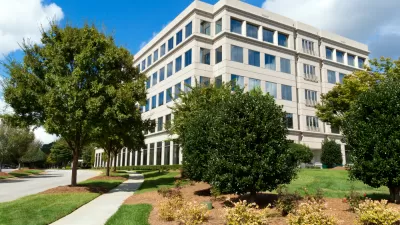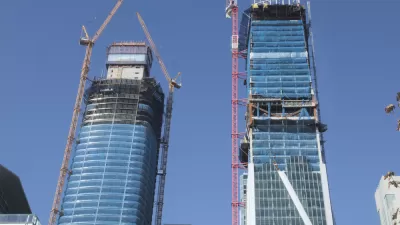A recent spate of reports has examined the up-and-down U.S. economy and predicted the need for more office space to fuel the growing workforce.

"Though economic boosts this week were brought on by strong corporate earnings reports, continued job growth in the high tech sector has been the main catalyst to the resurgence of the U.S. office sector," according to an article by Robert Carr.
The article bases that conclusion on data found in the July Beige Book report by the U.S. Federal Reserve Board, which shows continued payroll growth, and a "Friday Market Insight Report" from Newmark Grubb Knight Frank, which also showed job growth in June moving at "lightning speed."
Carr explores the job data's implications for office real estate, finding an expert willing to argue strongly for the continued growth of the tech industry's influence in the market:
Technology talent is fueling most of the office use growth, says Colin Yasukochi, director of research and analysis for the Northern California region with real estate services firm CBRE. He recently authored the “2016 Scoring Tech Talent” report for the company. High tech companies’ share of major leasing activity increased from 11.0 percent in 2011 to 18.0 percent in 2015 nationwide, he notes—the largest single share of any industry. The number of tech talent workers in the labor force increased 27.0 percent during the past five years, adding more than one million jobs to the national economy, at more than three times the national average for all occupations.
According to Yasukochi, traditional tech cities like San Francisco, Washington, D.C., New York, Seattle, and Austin will continue to lead the country's tech job market, but new arrivals to the scene, like Nashville, Charlotte, Tampa, Seattle, and Phoenix, will also be faced with growing demand for office space.
FULL STORY: Tech Workers Control Current Office Market Patterns

Trump Administration Could Effectively End Housing Voucher Program
Federal officials are eyeing major cuts to the Section 8 program that helps millions of low-income households pay rent.

Planetizen Federal Action Tracker
A weekly monitor of how Trump’s orders and actions are impacting planners and planning in America.

Ken Jennings Launches Transit Web Series
The Jeopardy champ wants you to ride public transit.

Rebuilding Smarter: How LA County Is Guiding Fire-Ravaged Communities Toward Resilience
Los Angeles County is leading a coordinated effort to help fire-impacted communities rebuild with resilience by providing recovery resources, promoting fire-wise design, and aligning reconstruction with broader sustainability and climate goals.

When Borders Blur: Regional Collaboration in Action
As regional challenges outgrow city boundaries, “When Borders Blur” explores how cross-jurisdictional collaboration can drive smarter, more resilient urban planning, sharing real-world lessons from thriving partnerships across North America.

Philadelphia Is Expanding its Network of Roundabouts
Roundabouts are widely shown to decrease traffic speed, reduce congestion, and improve efficiency.
Urban Design for Planners 1: Software Tools
This six-course series explores essential urban design concepts using open source software and equips planners with the tools they need to participate fully in the urban design process.
Planning for Universal Design
Learn the tools for implementing Universal Design in planning regulations.
Ada County Highway District
Clanton & Associates, Inc.
Jessamine County Fiscal Court
Institute for Housing and Urban Development Studies (IHS)
City of Grandview
Harvard GSD Executive Education
Toledo-Lucas County Plan Commissions
Salt Lake City
NYU Wagner Graduate School of Public Service




























